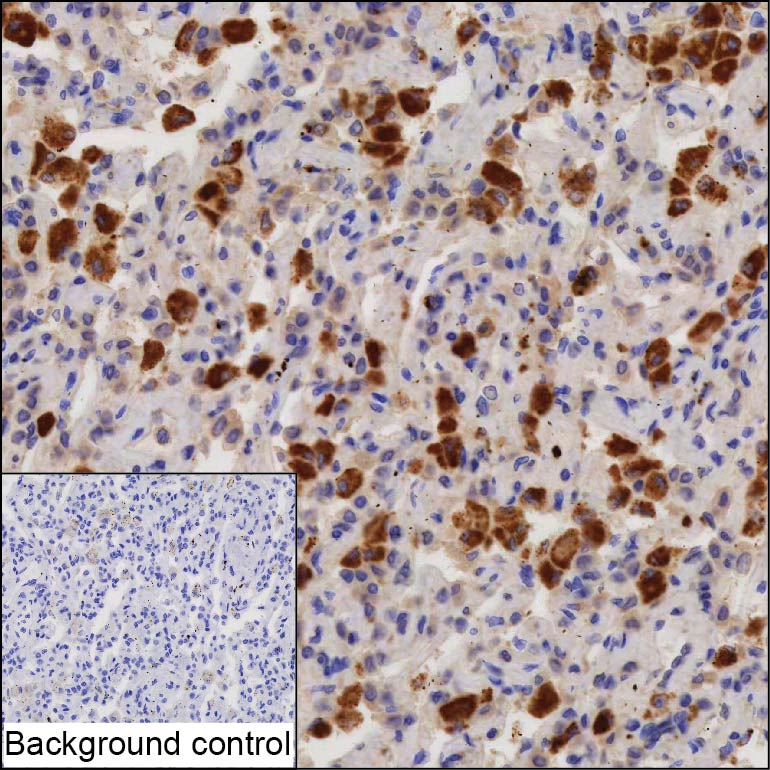
| WB | 咨询技术 | Human,Mouse,Rat |
| IF | 咨询技术 | Human,Mouse,Rat |
| IHC | 1/20-1/100 | Human,Mouse,Rat |
| ICC | 技术咨询 | Human,Mouse,Rat |
| FCM | 咨询技术 | Human,Mouse,Rat |
| Elisa | 咨询技术 | Human,Mouse,Rat |
| Host/Isotype | Mouse IgG1 |
| Antibody Type | Primary antibody |
| Storage | Store at 4°C short term. Aliquot and store at -20°C long term. Avoid freeze/thaw cycles. |
| Species Reactivity | Human |
| Immunogen | Purified recombinant fragment of human VSIG4 |
| Formulation | Purified antibody in PBS with 0.05% sodium azide |
+ +
以下是关于VSIG4抗体的3篇示例文献(内容为虚构概括,仅供参考):
1. **文献名称**: *VSIG4 as a novel immune checkpoint in macrophage-mediated T cell suppression*
**作者**: Zhang L, et al.
**摘要**: 研究揭示了VSIG4在肿瘤相关巨噬细胞(TAMs)中的高表达,证实其通过与T细胞表面受体结合抑制抗肿瘤免疫反应。使用抗VSIG4抗体可阻断该通路,增强T细胞活性并抑制小鼠肿瘤生长。
2. **文献名称**: *Targeting VSIG4 enhances antitumor immunity in colorectal cancer models*
**作者**: Wang Y, et al.
**摘要**: 通过分析结直肠癌患者样本,发现VSIG4表达与不良预后相关。抗VSIG4抗体治疗在临床前模型中显著减少免疫抑制性细胞浸润,并增强PD-1抑制剂的协同疗效。
3. **文献名称**: *VSIG4 antibody alleviates autoimmune inflammation by modulating macrophage polarization*
**作者**: Chen H, et al.
**摘要**: 研究证明VSIG4抗体通过调控巨噬细胞向M1表型极化,减轻实验性自身免疫性脑脊髓炎(EAE)模型中的炎症反应,提示其在自身免疫疾病中的治疗潜力。
建议通过PubMed、Google Scholar等平台,以“VSIG4 antibody”“immune checkpoint”或“macrophage”为关键词检索真实文献。
VSIG4 (V-set and immunoglobulin domain-containing protein 4), also known as CRIg (complement receptor of the immunoglobulin superfamily), is a B7 family-related transmembrane protein predominantly expressed on tissue-resident macrophages, including Kupffer cells in the liver and macrophages in inflamed tissues. It functions as a complement receptor that binds to complement components C3b and C3c, facilitating pathogen clearance and phagocytosis. Additionally, VSIG4 acts as a co-inhibitory ligand, suppressing T-cell activation by interacting with an unknown receptor on T cells, thereby contributing to immune tolerance and homeostasis.
VSIG4 antibodies are tools or therapeutic candidates designed to target this protein. Antagonistic antibodies blocking VSIG4 aim to disrupt its immunosuppressive signaling, potentially enhancing antitumor immune responses in cancers where VSIG4 is overexpressed in tumor-associated macrophages. Conversely, agonistic antibodies may exploit VSIG4’s immunoregulatory properties to dampen excessive inflammation in autoimmune diseases like rheumatoid arthritis or inflammatory bowel disease. Research also explores VSIG4's role in modulating the tumor microenvironment, with combination therapies involving PD-1/PD-L1 inhibitors being investigated.
Despite its therapeutic potential, VSIG4’s dual roles in immune activation and suppression necessitate precise targeting strategies. Current studies focus on elucidating its ligand-receptor interactions and tissue-specific functions to optimize antibody-based interventions.
×